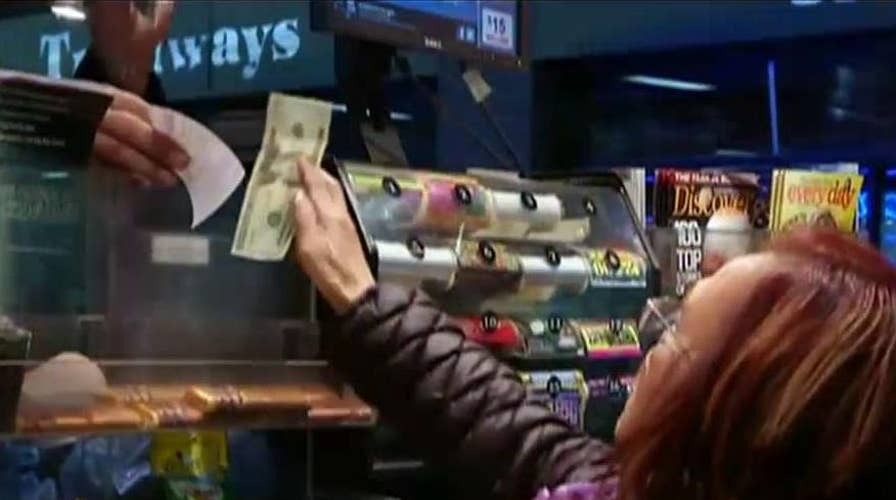Rush to get tickets for $1.5 billion Powerball drawing
Rick Leventhal reports from Hoboken, New Jersey
I’ve got my Powerball tickets. My wife reminded me to pick them up. I am, as many of you know, a psychiatrist. Debbie is a real estate attorney. We’re not strangers to data, statistics or numbers.
The odds of winning are about 1 in 292 million, which are said to be worse than the odds of being mauled by a bear and being attacked by a shark and marrying a supermodel, combined.
Well, that doesn’t matter to me or my wife, and it doesn’t seem to matter to the millions of Americans who have bought Powerball tickets in hopes of winning the $1.5 billion jackpot.
Why not? The psychological reasons, I believe, are simple.
First, at two bucks, a Powerball ticket is an incredible deal, financially. No matter what the odds are of winning, there is almost nothing else you can do with two bucks that offers the chance to turn it into $1.5 billion. Maybe there isn’t anything else on earth. Maybe there never has been, in the history of the world.
Just think about that: Winning Powerball could be the best return on two dollars ever, in the history of the world. It’s a little bit of a miracle that that is possible, no? Tens of millions of people had to contribute to the Powerball frenzy to make it so. How can you not part with two dollars to be a part of it?
Second, winning the Powerball lottery is entirely unrelated to skill or strategy. The only thing you need to do is get a ticket. Sure, there are those who think they’re cagey, buying larger numbers of tickets in office pools and the like, but their chances are vanishingly slim, too. Playing takes no skill. Winning or losing is not connected to the contestant’s intelligence or preparation or race or religion or age or education. Everyone is on an equal footing. A billionaire might well buy a ticket. And a homeless man might. There’s really nothing you can do to prepare to compete, and that feels psychologically freeing.
Third, the experience of playing Powerball and losing is worth two dollars, when compared to a carnival ride. It lasts a lot longer – several days, if you buy your tickets far enough ahead of the drawing. It inspires lively discussion about what you, your friends or your family members would do with the money. It doesn’t hurt too much when the ride is over, because there’s another one starting up, anyhow. And the excitement can be lifelong if you’re willing to part with a couple of bucks twice a week.
Fourth, it allows for expressions of friendship, camaraderie and love. Yup, that’s right. I told the owner at the Black Duck, a fabulous convenience store in Newburyport, Mass., that I would give him $25 million if I won. And I meant it. He thanked me and seemed like he was actually grateful – not very grateful, just a tiny bit grateful. Then he wished me luck, and it seemed like he meant it. And if I don’t win and he doesn’t win, we can commiserate about being part of the great mass of humanity who didn’t, but who ponied up for the chance, anyhow. That’s pretty cool for two dollars, right?
And consider this: I told my son and daughter that I wouldn’t trade meeting either one of them in this life for a winning ticket. I wouldn’t sacrifice one year. Not a month. Not even close. And I meant that, too. From the bottom of my heart. And I think they could tell.
All that for two bucks? I really don’t care about the odds of actually winning the $1.5 billion. That two bucks is some of the best money I’ll ever spend.

